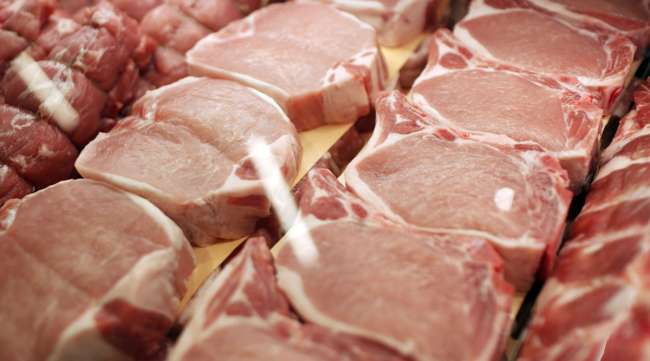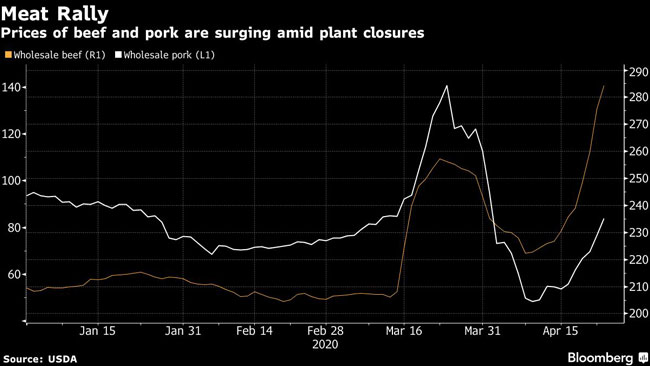Bloomberg News
Meat Supply Threats Grow With First Brazil Shutdown

[Ensure you have all the info you need in these unprecedented times. Subscribe now.]
It’s no longer just the U.S. that’s facing a meat scare. Top exporter Brazil is seeing its first plant shutdown, meaning the coronavirus is now snarling supplies from arguably the world’s most critical producer.
Labor inspectors ordered a halt at a poultry plant owned by JBS SA, the world’s top meat company, according to a Brazilian prosecutor. The South American nation is the largest global exporter of beef and chicken. JBS’ U.S operations rank No. 63 on the Transport Topics Top 100 list of the largest private carriers in North America.
That comes with the U.S. now likely just weeks away from seeing shortages. On April 24, Hormel Foods Corp. said it was idling two of its Jennie-O turkey plants in Minnesota. Indiana Packers said it was closing a key pork operation in the state, local media reported. That added to a flurry of closures reported in the space of just a few weeks.
The escalation in shutdowns for the meat industry has been staggering. A month ago, many analysts were assuring Americans that supplies were plentiful and the virus impact would be limited. Now, there’s suddenly a chorus of experts raising the alarm over shortfalls.
About 25% of American pork capacity and 10% of beef is now offline, according to the United Food & Commercial Workers, which estimates that at least 13 U.S. plants have seen closures.
To be sure, some plants have come back on line after testing workers and improving safety conditions, and most Brazilian facilities are still operating. Still, executives from Tyson Foods Inc., JBS and Smithfield Foods Inc., the biggest pork producer, have all warned that consumers are likely to see an impact at the grocery store.
At the same time, U.S. federal employees responsible for inspecting meat plants are falling ill. More than 100 inspection-service employees have tested positive for COVID-19, the government confirmed. At least two have deaths of inspectors have been reported.
U.S. inspectors travel among facilities. That’s adding to fears that shutdowns will keep occurring, especially if a sick federal employee brings the infection to plants where there’s not yet an outbreak.
Close confines for some workers, both at home and at the packing plants, also boosts the risk of transmitting the virus.
To be clear, the output from a plant where the virus pops up doesn’t pose health concerns because by all accounts, COVID-19 isn’t a food-borne illness. Products from a farm or a production plant with a confirmed case can still be sent out for distribution. But a production halt means that there’s no new supplies.
In Brazil, JBS’ Passo Fundo poultry plant in Rio Grande do Sul state was ordered to close after 36 of its workers tested positive for the virus, according to Priscila Schvarcz, a labor prosecutor in the municipality. The first COVID-19 case in the unit was reported April 13.
It wasn’t immediately clear whether JBS would appeal the order to close the plant.
That follows an evaluation of working conditions and measures taken to avoid contamination after the Labor Prosecutor’s office requested that all staff stop work for 14 days or until they can be tested, Schvarcz said.

“It’s a serious situation that requires immediate mitigation measures to halt an outbreak that is beginning,” she said in a telephone interview.
The chicken plant closure comes amid a jump in coronavirus cases in Brazil. Even so, some state and city officials are starting to ease quarantine measures, including Rio Grande do Sul and Passo Fundo. The city had 65 confirmed cases April 23. Brazil has 49,492 cases, with 407 deaths reported in the past 24 hours.
While JBS didn’t comment on the closure, the Sao Paulo-based company said it had taken all measures to guarantee the maximum safety of its employees following determination from health agencies. The company added it has detailed protocols in place if an employee tests positive.
“Brazilian meat companies have been taking a lot of preventative measures, but we don’t see progress in agglomeration of people,” said Jose Modelski Junior, a spokesperson for Contac, which represents food industry workers. “They are not willing to change the number of workers in the same shift, and we are worried about that.”
Want more news? Listen to today's daily briefing:




